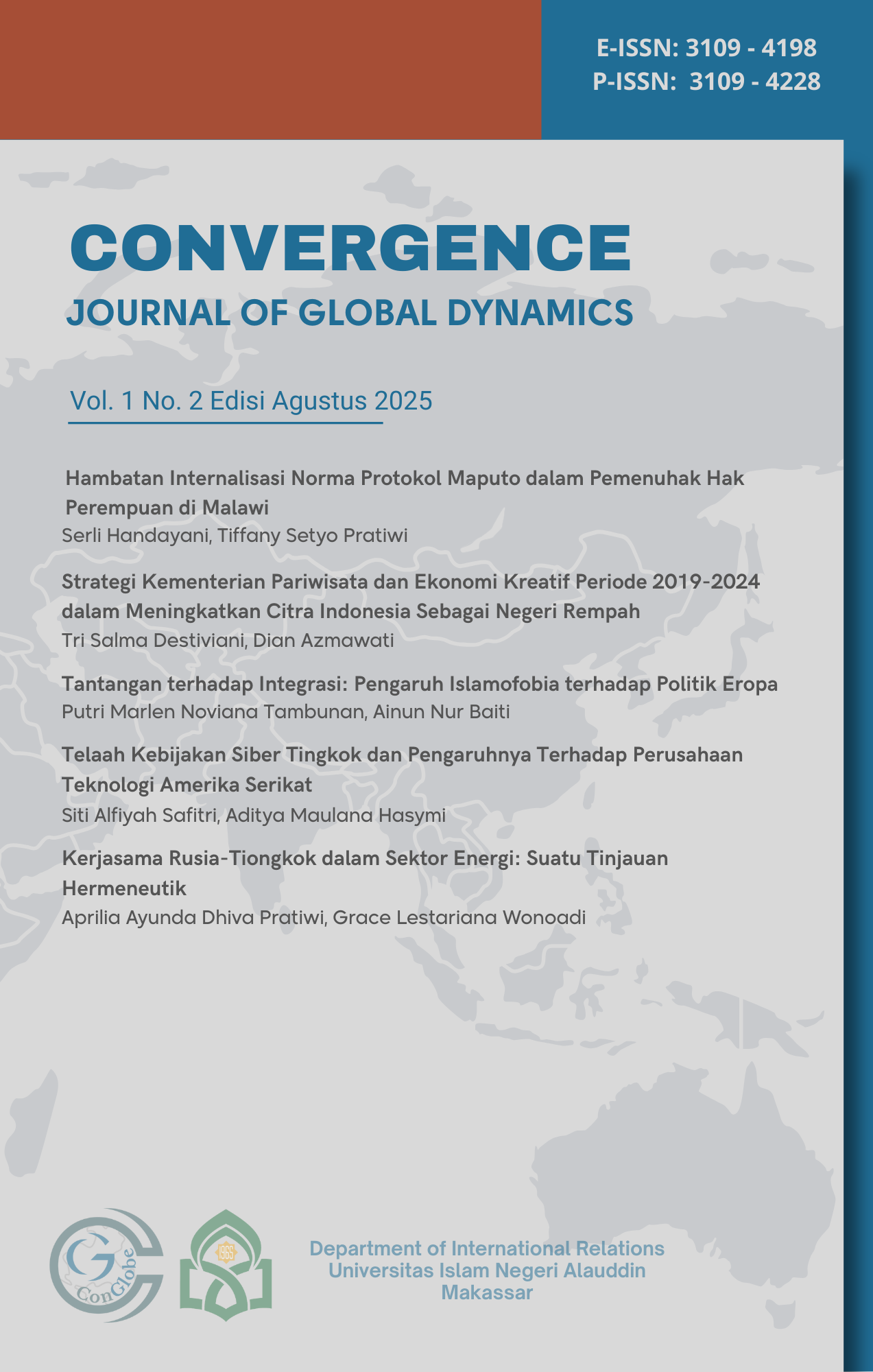TANTANGAN TERHADAP INTEGRASI: PENGARUH ISLAMOFOBIA TERHADAP POLITIK EROPA
Keywords:
Islamofobia, Politik Eropa, Umat Islam, IntegrasiAbstract
The purpose of this Journal is to find what are the challenges for Integration of Islamophobia's influence on politics in Europe, we know that Islam is the second largest religion in Europe, so its existence could have a significant influence on the political structure in Europe. This research uses descriptive qualitative research method, which makes literature research as its main reference, we use this method to analyze data from previous research. This research will focus on what are challenges to integration and European political order will be faced by people in Europe due to emergence of Islamophobia there. The main purpose of using Descriptive Qualitative method is so that the author can elaborate the issues to be discussed systematically in accordance with accurate and accountable facts. From this research, it’s found that the presence of Muslim immigrants in Europe has led to a rejection attitude from local community as they consider it’s presence as a threat to national identity, cultural values, and democratic principles that are upheld by European countries. One of the main reasons for this discrimination is that Islamic religious beliefs are not in line with concept of secularism, which is the basis of most countries in Europe.
References
Abdelkader, & Engy. (2017). A Comparative Analysis of European Islamophobia: France, UK,. UCLA Journal of Islamic and Near Eastern Law, 16(1), 31-60.
Anjani, M. M., & et all. (2023). Problematika Larangan Berhijab Di Prancis. Jurnal Kajian Islam Kontemporer, 1(1), 1-25.
Adetry , A., & Burhanuddin, A. (2024). Islamophobia in Europe and its Global Impact. Global Society, 1(1), 54-62.
Aked, H., Jones, M., & Miller, D. (2019). Islamophobia in Europe: How governments are enabling the far-right ‘counter-jihad’ movement. Bristol: Public Interest Investigations.
Azeez, I., & Jimoh, A. (2023). The Impact Of Islamophobia on Society, Attitudes, Policies and The Youths. Journal of Universal Studies, 3(7), 1322-1339.
Bayrakli, E., & Hafez, F. (2023). European Islamophobia Report. Austria: Leopold Weiss Institute.
Cesari, J. (2013). Why the West Fears Islam: An Exploration of Muslims in Liberal Democracies. Springer.
Feld, S. (2024, October 24). Islamophobia on the rise in the EU. One in two Muslims are victims of discrimination in daily life. Retrieved from EUNEWS: https://www.eunews.it/en/2024/10/24/islamopho bia-eu-muslims-discrimination/
Ghosh, D. (2022). The European Union’s Response to Islamophobia: An Assessment. Canadian Journal of European and Russian Studies, 15(1), 1-23.
Halim, A., & et all. (2022). Media and the Issue of Hijab and Veil across European Countries. Journal of AlTamaddun, 17(2), 203-211.
Hussain, S. M. (2025). Islamophobia: Causes, Effects, and Responses in the 21st.
CENTURY. Sociology & Cultural Research Review (JSCRR), 3(1), 742-754.
Ilmisani, R. A., & Juned, M. (2024). The European Network Against Racism (Enar) as NGO Against Islamophobia in France. Journal of Tourism Economics and Policy, 4(2), 116-127.
Kalmar, I. (2018). Islamophobia in the East of the European Union: an Introductions. Patterns of Prejudice, 52(2), 389-405. DOI: 10.1080/0031322X.2018.1512467
Kedikli, U., & Akça, M. (2018). Rising Islamophobic Discourses in Europe and Fight Against Islamophobia on the Basis of International Organizations. Mediterranean Journal of Social Sciences, 9(1), 9-22.
Morley, J. (2020). Islamophobia as a Vehicle for the Rise of European Populist Movements. Journal of Human Rights, 10(2), 1-10.
Moleong, L. J. (2017). Metodologi Penelitian Kualitatif. PT Remaja Rosdakarya.
Pickel, G., & Öztürk, C. (2018). Islamophobia Without Muslims? The “Contact Hypothesis” as an Explanation for Anti Muslim Attitudes – Eastern European Societies in a Comparative Perspective. Journal of Nationalism, Memory & Language Politics, 12(2), 162-186.
Rahman, R. A., & Zulhaq, A. (2024). Islamophobia Perspektif Rasisme Epistemik. AL-AFKAR: Journal for Islamic Studies, 7(4), 1243-1260.
S., S. (2018). Islamophobia and the Europeanness of the other Europe. Patterns of Prejudice, 50(2), 420435. DOI: 10.1080/0031322X.2018.1512481
Sahar, D. (2024, January 2). The rise of islamophobia in the European nations and how to overcome this wham. Retrieved from Academia World News: https://academiaworldnews.com/the-rise-ofislamophobia-in-the-european-nations-and-how-toovercome-this-wham/ Gramedia.com. (2023, 27 September). Terminologi dan latar belakang terjadinya Perang Salib. Gramedia Literasi. https://www.gramedia.com/literasi/latarbelakang-terjadinya-perang-salib/ Faradilla, M. I. (2024).




